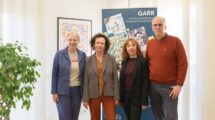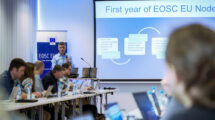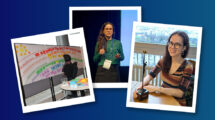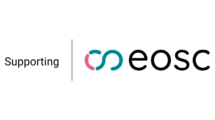![]() Emma Lazzeri is an Open Science expert at the Italian NREN GARR. On behalf of GARR, she is the Coordinator of the Skills4EOSC project, and she was involved in the EOSC-Pillar project as well as many other different projects and initiatives in the Open Science field. Additionally, she is the Coordinator of the ICDI Competence Centre for Open Science, FAIR and EOSC and she is sitting in different expert groups on Open Science at both national and European level. Her background is Telecommunication Engineering and she holds a PhD in Innovative Technologies from Scuola Superiore Sant’Anna, Italy.
Emma Lazzeri is an Open Science expert at the Italian NREN GARR. On behalf of GARR, she is the Coordinator of the Skills4EOSC project, and she was involved in the EOSC-Pillar project as well as many other different projects and initiatives in the Open Science field. Additionally, she is the Coordinator of the ICDI Competence Centre for Open Science, FAIR and EOSC and she is sitting in different expert groups on Open Science at both national and European level. Her background is Telecommunication Engineering and she holds a PhD in Innovative Technologies from Scuola Superiore Sant’Anna, Italy.
Emma, can you tell us more about GARR’s involvement in Open Science initiatives, both nationally and internationally?
GARR’s main objective is to support the Italian Research and Education community by providing high-performance connectivity and developing innovative services for the daily activities of researchers, professors and students as well as for international collaboration.
GARR is also one of four founding members of the EOSC Association on behalf of ICDI, which it represents as the Italian Mandated Organisation.
From 2019 to 2022 GARR coordinated the EOSC Pillar project, which was based on the idea that setting up a European infrastructure should be linked to national activities. Through the coordination of national initiatives in Italy, France, Germany, Austria and Belgium, the project built a federation of initiatives, developed transnational access, use cases of networks working to implement FAIR data practices and a training platform.
Currently, GARR coordinates the Skills4EOSC project, “Skills for the European Open Science Commons: Creating a Training Ecosystem for Open and FAIR Science” (2022-2025).
Specifically, what is GARR doing to support the Italian research community in the implementation of Open Science?
As mentioned, GARR is representing the Italian community in the EOSC Association on behalf of ICDI. Within ICDI, GARR is coordinating the Italian Competence Centre (ICDI-CC) on Open Science, FAIR, RDM and EOSC. Created in 2020, the ICDI-CC consists of a network of more than 60 national experts that provide training, support and other activities for the Italian community.
The ICDI Competence Centre is one of the key drivers for Open Science in Italy. By pooling the competences available within research institutions, universities and thematic and cross-discipline research infrastructures, the Competence Centre aims to act as a single national reference point for:
- providing support, consultancy and training activities on Open Science, FAIR principles and EOSC.
- fostering the integration of Open Science in the daily practice of different stakeholders, through the acquisition of skills and awareness raising on its positive effects.
- designing and promoting structured training and introducing the new professional figure of the data steward into research institutions.
- promoting the development and dissemination of good practices by making accessible guides, guidelines, standards, training and information resources.
ICDI-CC activities address a variety of stakeholders, such as those responsible for the governance of research institutions, public and private funding bodies, individual researchers and support staff, including the network of data stewards. The action targets all components of society that can contribute to and benefit from Open Science, the application of FAIR principles and the building of EOSC, such as public administrations, innovative enterprises and citizens.
In this context, the Competence Center regularly organises a series of webinars called ‘Open Science Café‘ to discuss Open Science topics with renowned experts in an informal way.
Finally, GARR is also one of the key actors involved in the working group created by the Italian Ministry of University and Research to support the operational phase of the National Open Science Plan.
At this year’s Open Science FAIR you are running a workshop on digital skills for open science, as coordinator of the Skills4EOSC project. Why do we need a focus on skills and what does the project aim to achieve?
Skills4EOSC is a Horizon Europe Infra-EOSC project, co-funded by the European Union and UK Research and Innovation (UKRI), aiming to create a coordination network of Competence Centres in the field of Open Science and FAIR research output management in the EOSC context.
Consisting of 44 partners, the project brings together leading experiences of national, regional, institutional and thematic Open Science and Data Competence Centres from 18 European countries with the goal of unifying the current training landscape into a common and trusted pan-European ecosystem, in order to accelerate the upskilling of European researchers and data professionals in the field of FAIR and Open Data, intensive-data science and Scientific Data Management.
Competence Centres (CCs) are seen as centres of gravity of Open Science and EOSC activities in their countries. These entities can either be established national initiatives (as is the case of ICDI in Italy) or initiatives under establishment or organizations which have the leading or mandated contribution to Open Science activities nationally. CCs offer training and support, empowerment, lifelong learning, professionalisation and resources to a variety of stakeholders, including not only researchers and data stewards, but also funders, decision makers, civil servants, and industry.

At this year’s Open Science FAIR in Madrid, we jointly organised a workshop with the PATTERN project and the EOSC Association Task Force on Data Stewardship curricula and career paths. Counting more than 100 attendees, this energetic and dynamic workshop showcased the recent advances in training both from the policy and methods perspective. Skills4EOSC presented its latest results in terms of competence definition and methodology, which respond to the current framework of the European Union on skills definition and career development (the European Researcher Competence Framework, The Council Conclusions, ERA actions and the European Year of Skills):
- the Skill4EOSC Minimum Viable Skillset (MVS) which draw on established competences frameworks and resources defining the Open Science mission, activities, or outcomes expected of relevant roles. MVS synthesise these, profiling each role as an aid to developing new curricula, career paths and courses.
- The Skills4EOSC FAIR-by-design methodology for learning materials, which describes the production of learning materials based on the backward instructional process that is extended with additional activities focusing on the implementation of the FAIR guiding principles. A general discussion on important aspects of implementation such as granularity, scope, metadata schema, interoperability and publication in relevant repositories is provided together with a step by step six stage workflow and checklists that help implement the FAIR-by-design process.
You are also just back from the EOSC Symposium in Madrid, where the GÉANT community was well represented. What is your main takeaway from the conference?
The EOSC Symposium was highly participated in its 2023 edition, in particular by NRENs which play a leading role in the co-creation of EOSC. As the EOSC is shaping more and more, also from a technical perspective, with the attention now being concentrated around the concept of EOSC-nodes, the GÉANT community is bringing its expertise in the creation of a unique federated environment to support the European and Global research community.
This year, the themes of the Open Science Fair and EOSC Symposium were respectively “Charting the course: reimagining Open Science for next generations” and “Taking EOSC into the Future”. What would you like to see in the future of open science?
Open Science is becoming the norm, and as more and more initiatives are embracing various aspects of Open Science, many researchers are still left behind. GARR’s support goes in the direction of raising awareness and building the skills needed to support the national and European community in the application of Open Science and FAIR principles. I would like to see more researchers involved in the future of open science and of its key events to effectively co-create the EOSC of the Future with and for researchers.
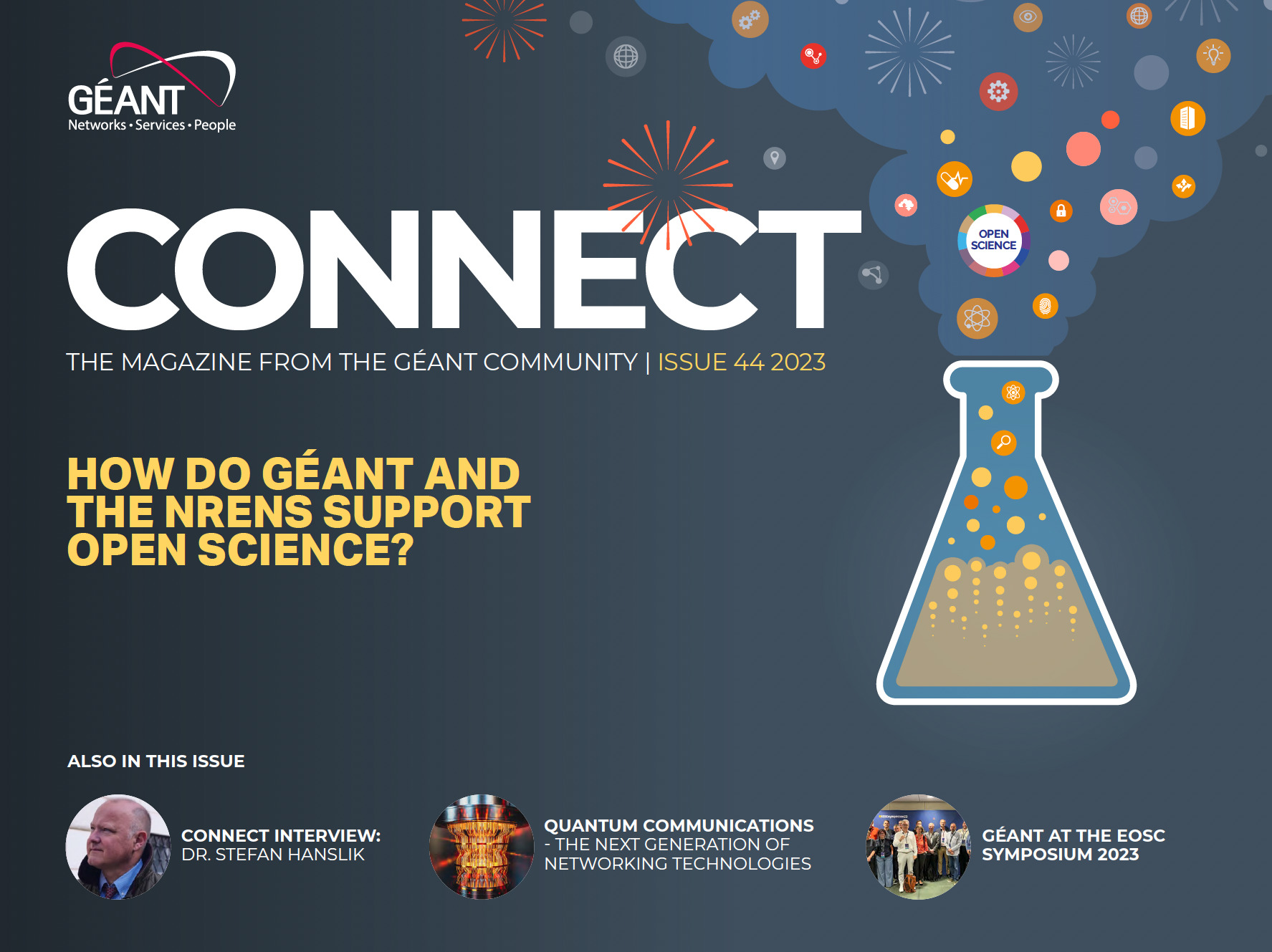
Read or download the full magazine here


